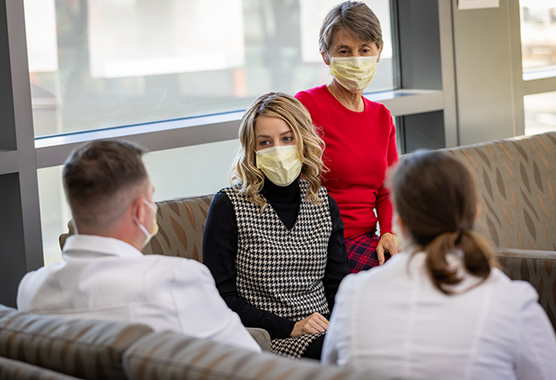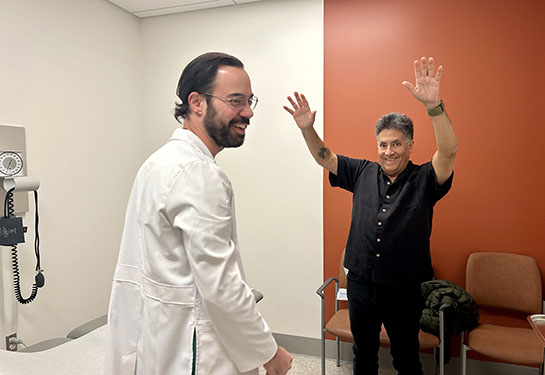Musculoskeletal Tumors
We deliver exceptional care and hope for healing of rare tumors affecting the spine, bones and soft tissue of the musculoskeletal system.
Medically reviewed by Steven Thorpe, M.D. on July 11, 2023.

What Are Musculoskeletal Tumors?
These tumors affect the spine, bones and soft tissue, including fat cells, nerves, connective tissue and joints. They can occur in nearly any area of your body and may be cancerous or noncancerous (benign).
There are more than 70 types of musculoskeletal tumors. Some grow slowly, and others rapidly. The likelihood of these tumors spreading to other areas of your body varies significantly. Receiving care from experts who regularly treat them gives you the best chances for good outcomes.
UC Davis Health Department of Orthopaedics offers extensive experience in musculoskeletal cancer. People across Northern California and Northern Nevada turn to us because we successfully treat the most complex cases. We offer innovative options that preserve your quality of life and advance the field through research.
Sarcoma, Bone and Spinal Tumor Symptoms
Symptoms depend on where the tumor starts and how fast it’s growing. Some people experience no symptoms, especially when tumors are small.
Common Symptoms
Musculoskeletal cancer symptoms may include:
- Bone that breaks easily
- Difficulty controlling your bowels or bladder
- Joint pain
- Loss of sensation or weakness
- Mass that may or may not be painful
- Swelling
Sarcoma, Bone Cancer and Spine Tumor Causes
These tumors occur when cells in your soft tissue, bones or spine multiply rapidly. Researchers are still investigating how and why these develop.
There are some factors that can increase you risk for musculoskeletal cancer, including:
Familial Cancer Syndromes
Certain inherited conditions can raise your risk of cancer, including musculoskeletal tumors. They are neurofibromatosis, Li-Fraumeni syndrome and familial adenomatous polyposis.
Previous Radiation Therapy
There’s a small risk of musculoskeletal tumors if you have previously had radiation therapy for cancer. Tumors typically form years after treatment and develop near the previous cancer site.
Weakened Immune System
Certain conditions that weaken your immune system can increase the likelihood of sarcomas. They include human immunodeficiency virus (HIV), psoriasis and lupus.
Diagnosing Musculoskeletal Cancer
UC Davis Health offers all the diagnostic testing you need for an accurate diagnosis. Our specialists start with a thorough evaluation that includes taking your medical history and performing a physical exam.
Depending on the area of concern, you will also need one or more tests. These include imaging studies, such as MRIs, ultrasounds or positron emission tomography (PET) scans.
We may also take a tissue sample (biopsy). Expert pathologists specializing in bone and soft tissue tumors help us confirm the diagnosis, including the tumor or cancer type and grade (severity).
Musculoskeletal Cancer Treatments at UC Davis Health
Our Department of Orthopaedic Surgery ranks among the nation’s best and delivers the highest level of care for sarcomas, bone cancer and spinal tumors. Even if the tumor is large or in an area that’s difficult to reach, we can help you.
You have access to an entire team of musculoskeletal tumor specialists. Orthopaedic oncology and spine surgeons work closely with experts in radiation oncology, medical oncology and radiology to develop an individualized treatment plan. Additional expertise in plastic and reconstructive surgery and vascular surgery is available to help us deliver sophisticated therapies for complex cases.
As leaders in the field, we are advancing care and outcomes through research. We regularly publish our findings, sharing new knowledge with providers worldwide. We also train emerging musculoskeletal cancer experts through a prestigious fellowship program.
Surgery
Surgery is a common musculoskeletal tumor treatment and may be the only therapy you need. Our expertise in limb-sparing techniques helps more people avoid amputation while optimizing function.
Radiation Therapy
This treatment uses radiation to destroy microscopic tumor cells that may remain after surgery. We offer advanced options, including high-dose therapies that enable you to complete treatment quickly.
Medical Oncology
Chemotherapy involves substances that kill tumor cells or stop them from growing. We also offer targeted therapy, which uses substances that attack specific cell mutations.
Physical Therapy
Treatments to remove or destroy sarcomas, bone cancer and spinal tumors can impact your ability to move the affected area. Physical therapy helps you regain strength and cope with treatment-related changes to your abilities.
Preventing Sarcomas, Bone Cancer and Spinal Tumors
Musculoskeletal tumors are typically not preventable since it’s not possible to control risk factors. Many tumors arise from spontaneous (uncontrolled), complex events on the molecular and cellular level. If you face a higher likelihood of these tumors, regular monitoring for changes can lead to early detection.
Source: “Sarcomas, Soft Tissue: Introduction,” American Society of Clinical Oncology, https://www.cancer.net/cancer-types/sarcomas-soft-tissue/introduction
Where do sarcomas develop?
60%Start in the arm or leg
How rare is primary bone cancer?
<1%Of all cancers start in the bones
Up to
65% Of spinal tumors are noncancerous
Sources: American Society of Clinical Oncology: Types of Cancer: Sarcoma, Soft Tissue Cancer Guide
American Cancer Society: Bone Cancer: Key Statistics About Bone Cancer
American Academy of Physical Medicine and Rehabilitation: Rehabilitation of Central Nervous System Disorders: Spinal Tumors
Request an Appointment
As Sacramento's No. 1 hospital, you'll benefit from unique advantages in primary care and specialty care. This includes prevention, diagnosis and treatment options from experts in 150 specialties.
Referring Physicians
To refer a patient, submit an electronic referral form or call.
800-4-UCDAVIS
Patients
Call to make an appointment.
Consumer Resource Center
800-2-UCDAVIS

Ranked among the nation’s best hospitals
A U.S. News & World Report best hospital in cardiology, heart & vascular surgery, diabetes & endocrinology, ENT, geriatrics, neurology & neurosurgery, and pulmonology & lung surgery.

Ranked among the nation’s best children’s hospitals
U.S. News & World Report ranked UC Davis Children’s Hospital among the best in pediatric nephrology, orthopedics*, and pulmonology & lung surgery. (*Together with Shriners Children’s Northern California)

Ranked Sacramento’s #1 hospital
Ranked Sacramento’s #1 hospital by U.S. News, and high-performing in aortic valve surgery, back surgery (spinal fusion), COPD, colon cancer surgery, diabetes, gynecological cancer surgery, heart arrhythmia, heart failure, kidney failure, leukemia, lymphoma & myeloma, lung cancer surgery, pacemaker implantation, pneumonia, prostate cancer surgery, stroke, TAVR, cancer, orthopedics, gastroenterology & GI surgery, and urology.

The nation’s highest nursing honor
UC Davis Medical Center has received Magnet® recognition, the nation’s highest honor for nursing excellence.

World-class cancer care
One of ~59 U.S. cancer centers designated “comprehensive” by the National Cancer Institute.

A leader in health care equality
For the 13th consecutive year, UC Davis Medical Center has been recognized as an LGBTQ+ Healthcare Equality Leader by the educational arm of America’s largest civil rights organization.

